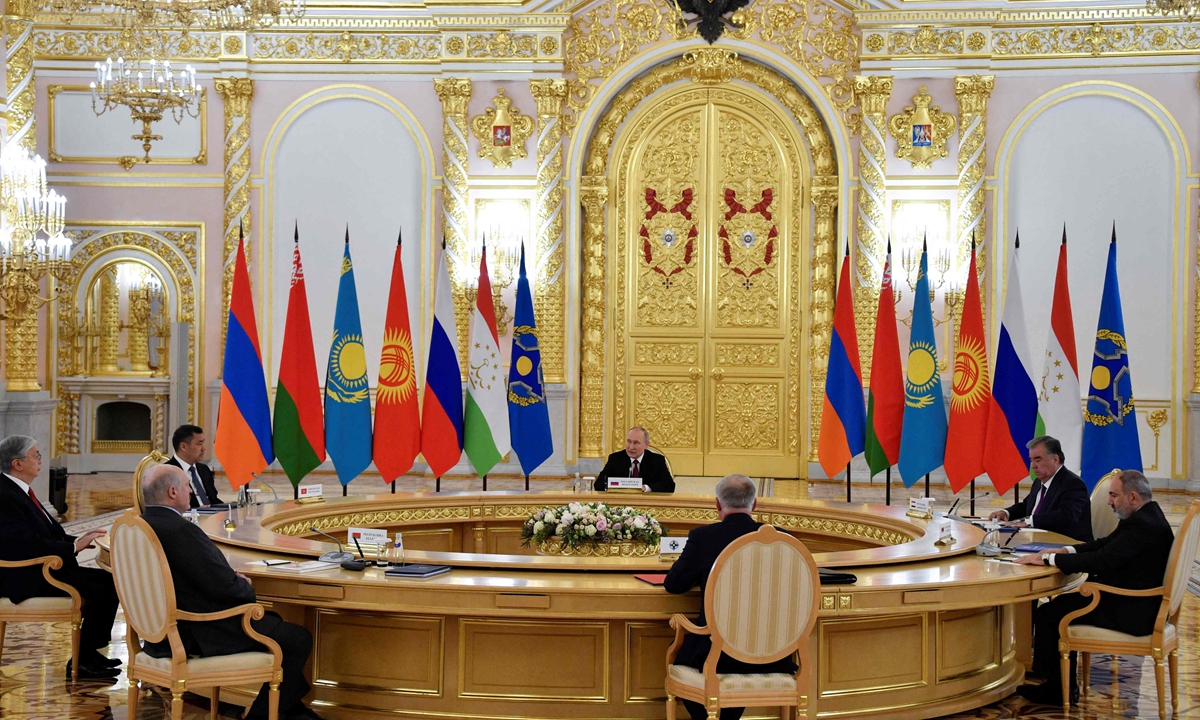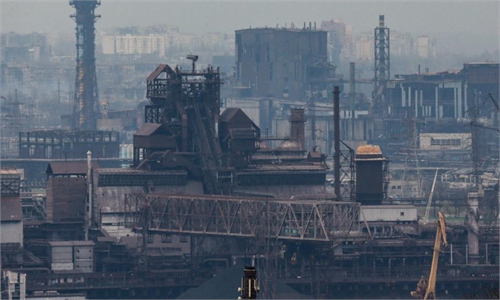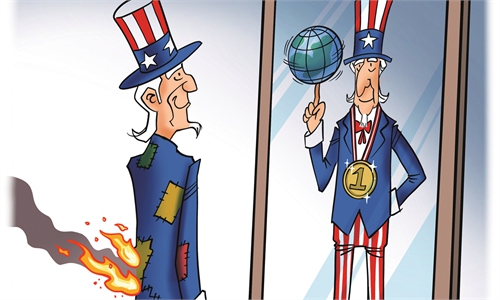
Heads of the Collective Security Treaty member states have a meeting in Moscow, Russia, on May 16, 2022, for the first time since 2019 amid the Ukraine crisis. Photo: VCG
The Collective Security Treaty Organization (CSTO) leaders met in Moscow on Monday for the first time since 2019 amid the Ukraine crisis that unnerved the post-Soviet Russia-led security bloc, with Chinese analysts saying that Putin will use the summit to further strengthen the organization to deal with the emerging threats of terrorism and "color revolution" and the Russia-led bloc is also likely to deliver a consistent message to the West which has been sowing discord between Moscow and other CSTO members.
According to TASS, the summit was attended by leaders of all six member-states, including Russian President Vladimir Putin and Belarusian President Alexander Lukashenko.
Putin said at the summit that Russia has long expressed concerns about the activity of US biological laboratories in the post-Soviet space, and the main goal of the US bio-labs there was to gather biological materials and study the spread patterns of viruses, Sputnik reported on Monday.
Commenting on the decision of Finland and Sweden to join the NATO, Putin said that the expansion of NATO in this direction does not create threats for Russia per se as Moscow has no row with these two countries. However, the expansion of the alliance's military infrastructure to Finland and Sweden will prompt a response from Russia, according to the Sputnik report.
Heads of the Collective Security Treaty member states signed multilateral documents at the summit on Monday.
The summit, held on the 30th anniversary of the Collective Security Treaty and the 20th anniversary of the CSTO, was expected to discuss key issues of cooperation, current international and regional issues, as well as measures to further improve the collective security system and may also touch upon the situation in Ukraine, TASS reported earlier.
Chinese analysts said Monday's summit was of great significance to Russia and the bloc amid the Ukraine crisis and multiple emerging internal challenges on security and economy, and CSTO leaders would discuss the regional security situation, especially the emerging threat of terrorism and prevention of large-scale riots like the one in Kazakhstan in January, as well as worries of some members over the Ukraine crisis, as the biggest warning of Ukraine crisis for central Asian countries was to prevent a "color revolution."
Zhu Yongbiao, director of the Center for Afghanistan Studies at Lanzhou University, told the Global Times that some CSTO members are worried that provoked by the West, the Ukraine crisis may stir up domestic opposition forces to result in "color revolutions."
Analysts said that some West countries are being judgmental about CSTO and that CSTO has increasingly become a "firewall" to prevent outside forces from carrying out "color revolutions" in Central Asia.
Analysts said the prevention of "color revolutions" is a long-term target for Central Asian countries, as the US has long planned and implemented "color revolutions" in the region since the "Rose Revolution" in Georgia in 2003.
Cui Heng, an assistant research fellow from the Center for Russian Studies of East China Normal University, told the Global Times that some CSTO members like Kazakhstan also develop ties with the US.
According to Kazakhstan's Astana Times, a top level Kazakh delegation visited the US at the end of April to discuss the strategic partnership with the US and talk to American partners so that the sanctions against Russia over Ukraine could be designed in a way that causes the "least collateral damage" to Kazakhstan.
On the Russia-Ukraine conflict, the Central Asian countries did not fully support Russia or criticize Russia like Western countries.
During a UN General Assembly in March when many members voted to approve a resolution denouncing Russia's military operation in Ukraine, 35 countries abstained, including Armenia, Kazakhstan and Tajikistan, and four including Belarus joined Russia in voting against it.
CSTO leaders are likely to reach consensus on opposing neo-Nazis and external military interference, Zhang Hong, an associate research fellow at the Institute of Russian, Eastern European and Central Asian Studies of the Chinese Academy of Social Sciences, told the Global Times.
Zhang believes that the security pressure in Central Asia rose sharply after the withdrawal of US troops from Afghanistan.
Central Asia faced multiple challenges recently, with economic pressure as the priority, Zhu said.
The Russia-Ukraine conflict aggravated the economies of many Central Asian countries that have already been hit hard by the pandemic, facing currency devaluation and rising prices, Zhu said, noting that the economic problem may also lead to social and political problems.
Emerging terrorism, extremism, and separatism, known as the "three evil forces," was another major challenge for CSTO members including Tajikistan and Kyrgyzstan, especially since Russia's move of deploying some of its security forces to Ukraine led to the reduction of efforts on counterterrorism in the region, Cui said.
According to TASS, Belarusian Defense Minister Viktor Khrenin said in an interview that threats and challenges to CSTO countries are changing. "Naturally, I don't think that color revolutions will be gone for good, that there will be no terrorism and drug and human trafficking, and biological threats. The organization will develop amid these challenges," he said.
Cui said that amid these challenges, the CSTO will further strengthen its quick response in maintaining regional political stability in order to "put out" terrorism and possible "color revolutions."




